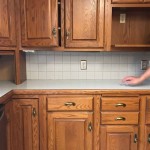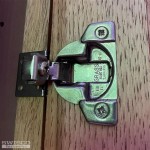Best Way to Clean Kitchen Granite Countertops
Granite countertops are a popular choice for kitchens due to their durability, aesthetic appeal, and resistance to heat. However, maintaining their pristine appearance requires regular cleaning and care. Understanding the proper methods and avoiding harmful products is crucial to preserving the longevity and beauty of this investment. This article provides a comprehensive guide to the best practices for cleaning granite countertops, ensuring they remain a stunning focal point in any kitchen for years to come.
Granite, a naturally occurring igneous rock, is porous to varying degrees depending on its composition and the sealant applied. This porosity makes it susceptible to staining if spills are not addressed promptly. Furthermore, using abrasive cleaners or harsh chemicals can damage the sealant, making the granite even more vulnerable to stains and etching. Therefore, a gentle and consistent cleaning routine is paramount.
Daily Cleaning Practices
The cornerstone of granite countertop maintenance is a simple daily cleaning routine. This involves wiping down the surfaces after each use, especially after food preparation. The primary objective is to remove any spills, crumbs, or splatters before they have a chance to penetrate the granite or damage the sealant. The appropriate materials and techniques for this daily cleaning are essential for preventing long-term issues.
The preferred cleaning solution for daily maintenance is a mixture of warm water and a pH-neutral dish soap. A few drops of soap are sufficient for a standard-sized spray bottle filled with water. Avoid soaps that contain lemon, vinegar, or other acidic ingredients, as these can degrade the sealant over time. Ideally, the chosen dish soap should be formulated for delicate surfaces and free of harsh chemicals. Test the soap in an inconspicuous area of the countertop first to ensure it does not cause any discoloration or dullness.
To clean, spray the solution onto the countertop surface and wipe it down with a soft, non-abrasive cloth, such as a microfiber cloth. Microfiber cloths are particularly effective because they trap dirt and debris without scratching the surface. Avoid using abrasive sponges, scouring pads, or steel wool, as these can damage the sealant and the granite itself. After wiping the surface with the soapy water solution, use a separate clean, dry microfiber cloth to buff the countertop. This step helps to remove any residual moisture and prevent water spots, leaving the surface shining.
For those seeking an even more natural cleaning option, a solution of warm water and a small amount of rubbing alcohol (isopropyl alcohol) can be used. The alcohol helps to disinfect the surface and evaporates quickly, preventing water spots. However, it is crucial to use rubbing alcohol sparingly, as excessive use can also degrade the sealant over time. A ratio of approximately 1 part rubbing alcohol to 3 parts water is generally recommended.
Addressing spills immediately is a critical aspect of daily cleaning. Any liquid, especially acidic substances like wine, juice, or vinegar, should be wiped up as quickly as possible. Use a clean cloth or paper towel to blot the spill, rather than wiping it, to prevent spreading the stain. After blotting the spill, clean the area with the warm water and dish soap solution as described above.
Deep Cleaning Techniques
In addition to daily cleaning, granite countertops benefit from periodic deep cleaning to remove accumulated dirt, grime, and residues. This deep cleaning should be performed approximately once a month, or more frequently if the countertops are subjected to heavy use. The goal is to thoroughly clean the surface without damaging the sealant or the granite itself.
For deep cleaning, a specialized granite cleaner is recommended. These cleaners are formulated to be pH-neutral and gentle on granite surfaces. They often contain ingredients that help to loosen dirt and grime without stripping the sealant. When selecting a granite cleaner, ensure that it is specifically designed for granite and does not contain any abrasive ingredients, ammonia, bleach, or other harsh chemicals.
Follow the instructions on the granite cleaner label carefully. Generally, the cleaner will be sprayed onto the countertop surface and allowed to sit for a few minutes to penetrate the dirt and grime. Then, the surface should be wiped down with a soft, non-abrasive cloth. Rinse the countertop with clean water to remove any residual cleaner and dry it thoroughly with a clean microfiber cloth. Buffing the surface after drying will enhance its shine.
Another option for deep cleaning is to create a paste of baking soda and water. Baking soda is a mild abrasive that can help to remove stubborn stains and grime. Mix baking soda with enough water to form a thick paste. Apply the paste to the stained or dirty area and allow it to sit for 15-20 minutes. Then, gently scrub the area with a soft cloth or sponge and rinse thoroughly with clean water. Dry the countertop with a clean microfiber cloth and buff to a shine. It is important to test baking soda paste in an inconspicuous area first to ensure it does not scratch or dull the granite.
For particularly stubborn stains, a poultice may be necessary. A poultice is a paste-like mixture that draws out stains from porous materials. Several types of poultices can be used on granite, depending on the type of stain. For oil-based stains, such as oil spills or grease splatters, a poultice made from baking soda and acetone can be effective. For water-based stains, such as coffee, tea, or juice, a poultice made from baking soda and hydrogen peroxide may be more appropriate. Apply the poultice to the stained area, cover it with plastic wrap, and allow it to sit for 24-48 hours. The poultice will draw the stain out of the granite. After the poultice has dried, remove it and clean the area with a warm water and dish soap solution. Rinse thoroughly and dry with a clean microfiber cloth.
Preventative Measures and Long-Term Care
Beyond regular cleaning, implementing preventative measures is crucial for maintaining the beauty and longevity of granite countertops. These measures help to minimize the risk of stains, scratches, and other damage, reducing the need for intensive cleaning and repairs. Proactive care ensures that the countertops remain in optimal condition for years to come.
One of the most important preventative measures is to use cutting boards when preparing food. Cutting directly on granite can scratch the surface and dull knives. Invest in a variety of cutting boards in different sizes and materials, such as wood, plastic, or bamboo, to suit different food preparation tasks. Always use a cutting board when chopping, slicing, or dicing food on the countertop.
Another crucial preventative measure is to use coasters and placemats. Coasters protect the granite from water rings and stains caused by condensation from drinks. Placemats protect the surface from scratches and spills during meals. Choose coasters and placemats that are made from non-abrasive materials, such as felt, cork, or cloth, to avoid scratching the countertop. Encourage family members and guests to use coasters and placemats consistently.
Protecting granite countertops from heat is also essential. Although granite is heat-resistant, prolonged exposure to high temperatures can damage the sealant and potentially cause cracks or discoloration. Always use trivets or hot pads when placing hot pots, pans, or dishes on the countertop. Avoid placing hot appliances, such as toasters or coffee makers, directly on the granite surface. Choose trivets and hot pads that are made from heat-resistant materials, such as silicone or cork.
Sealing granite countertops is a critical aspect of long-term care. The sealant helps to protect the granite from stains and water damage. Over time, the sealant can wear away, making the granite more vulnerable to damage. The frequency with which granite countertops need to be resealed depends on the type of granite, the type of sealant used, and the level of use. Generally, granite countertops should be resealed every one to two years. Check the sealant regularly by placing a few drops of water on the surface. If the water beads up, the sealant is still effective. If the water soaks into the granite, it is time to reseal the countertop. Consult with a professional granite installer or supplier for recommendations on the best sealant to use and the proper application method.
Avoiding harsh chemicals and abrasive cleaners is paramount for preserving the integrity of granite countertops. Never use products that contain ammonia, bleach, vinegar, lemon, or other acidic ingredients, as these can damage the sealant and etch the granite. Avoid using abrasive sponges, scouring pads, steel wool, or other abrasive materials, as these can scratch the surface. Always use a pH-neutral cleaner specifically designed for granite or a mild solution of warm water and dish soap. Spot test any new cleaning product in an inconspicuous area before using it on the entire countertop.
By adhering to these daily cleaning practices, deep cleaning techniques, and preventative measures, maintaining granite countertops' beauty and integrity is achievable. Consistent care and attention will ensure that they remain a stunning and durable feature in the kitchen for many years.

How To Clean Granite Countertops With Steam

How To Clean Seal And Polish Granite Countertops Pro Housekeepers
Best Way To Clean Granite Countertops So They Can Sparkle Cleaen

How To Properly Clean And Disinfect Your Kitchen Countertops

How To Clean Seal And Polish Granite Countertops Pro Housekeepers

How To Remove Stains From Granite Countertops Eagle Stones
Experts Explain The Best Way To Clean Granite Countertops And It Is Simpler Than You May Think

How To Clean Granite Countertops Plus Care Tips

How To Clean Kitchen Countertops Reviews By Wirecutter

How To Clean Granite Countertops Naturally And Ly
Related Posts








